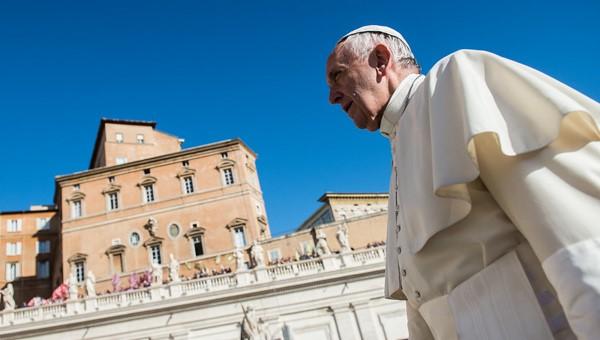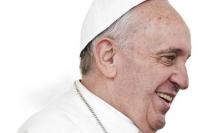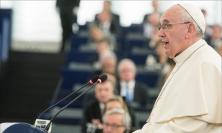Photo used under Creative Commons (CC BY-NC-SA 2.0) license
Writing for The Way, Tim McEvoy explains why the idea of Pope Francis as the Church’s spiritual director is one to which he is particularly drawn. He uses Christus vivit, Pope Francis’ apostolic exhortation addressed ‘to young people and to the entire people of God’, to explore what conversion and discernment mean in the mind of Francis and, in particular, how they relate to one another.
In his extraordinary decision to speak ‘to the city and to the world’ from St Peter’s Square at the beginning of the coronavirus pandemic, Pope Francis pointed his listeners and viewers to an urgent call to conversion:
You are calling on us to seize this time of trial as a time of choosing. It is not the time of your judgement, but of our judgement: a time to choose what matters and what passes away, a time to separate what is necessary from what is not. It is a time to get our lives back on track with regard to you, Lord, and to others.[1]
The image of Francis standing, frail and exposed, amid the dreary March rain and ambulance sirens of Rome in lockdown, is one that will stay with me for a very long time, and seemed to exemplify the closeness of this remarkable Pope to his people. At the darkest of times, he showed how the Church must stand, not aloof but in solidarity with others, holding out the hope of encountering grace and the Lord even from the cross of coronavirus. His papacy has been a model of that pastoral conversion ‘to show and live the way of mercy’ to which the Church has been called: drawing close to the people of God in the messy reality of their lives and getting his shoes dirty with the mud of the streets.[2]
Austen Ivereigh is quite right to compare Francis’s style of governance, revealed in a unique way during the pandemic, to that of a spiritual director accompanying the Church and helping it to navigate through the complex global crisis of our times in all its manifestations.[3] Key to this navigation has been his astute discernment of spirits and his uncanny ability to point out the false consolations and temptations of the bad spirit. Discernment has not only been an important pastoral and formational need identified by Francis for the Church but it has shaped the processes of his pontificate, and indeed his life, in definitive ways, as many commentators have noted.[4] A synodal, journeying Church with Christ at its centre must be discerning at every level, individual and institutional, if it is not to get lost along the way, and is in need of continual reorientation and recentring.
For Francis, the themes of conversion and discernment appear to be inextricably linked, and I would like briefly to explore something of this overlapping relationship in his thought, particularly as it appears in his latest apostolic exhortation, Christus vivit, and to trace its roots back to his grounding in the Ignatian tradition of spiritual discernment. The word ‘roots’ has significance for Pope Francis in terms of how he views the world and the interconnected crises it currently faces, as has already been noted.[5] In an era of ‘liquid capitalism’, characterized by an ever more rapid pace of change and the loosening of traditional social, economic and political bonds, the image of roots conjures up neither artificial stability nor stubborn resistance to change but continued access to a deeper source of life and support.
Francis the spiritual director reminds us that, just as for the individual making a retreat and reviewing his or her ‘faith history’, the roots of a mature society and its ability to grow in a healthy direction lie in its collective ability to remember, to know and to judge past events – its ‘historical memory’.[6] Memory plays a crucial role in discernment for Francis, as it did for Ignatius. To be wise and discerning involves, in some sense, being ‘memory keepers’, as he puts it.[7]
It is interesting to note how Francis also uses the metaphor of roots in a discerning sense in reference to the COVID-19 pandemic and its graced opportunity for conversion. In his prophetic urbi et orbi he points out how the ‘tempest’ of the virus has exposed our vital need to be put ‘in touch with our roots’ and with all those things that truly ‘nourish, sustain and strengthen our lives and our communities’, recognising and reintegrating the wisdom and memory of our elders and the vital work of those who are often unappreciated and hidden from view: cleaners, nurses, caregivers. These life-giving roots are also the ‘antibodies we need to confront adversity’, as opposed to all that is false and superficial in our daily lives. Francis’s Lenten call to the Church to return wholeheartedly to God consists of making a comprehensive and compassionate review of our shared reality and choosing between what nourishes and what fails to nourish the soul.[8]
The twin threads of conversion and discernment, encountered throughout Francis’s official writings, are expressed at some depth in the latest post-synodal apostolic exhortation, Christus vivit, addressed ‘to young people and to the entire People of God’. After Amoris laetitia – also the product of long processes of communal discernment – it is, significantly, the document in which the words ‘discern’ and ‘discernment’ appear most frequently in his writings to date, with 34 mentions in 74 pages and a dedicated chapter on the vocational discernment of young people.[9] In it we get a real sense of what both conversion and discernment mean in the mind of Francis and, in particular, how they relate to one another.
Conversion, for the Church, says Francis, can be summarised as ‘renewal and a return to youth’. This is not youth in the false sense of a culture obsessed with youthful beauty or novelty, but the true youthfulness, life and energy that spring from openness to the ever-new Risen Jesus. It is an ongoing process of transformation that involves holding in creative tension the best of what is old, the Church’s life-nourishing roots, with an openness to embrace what is new in Christ. It means a constant readiness to respond to grace, to let go of what does not nourish and start again, returning to its ‘first love’: the source of the Church’s youthfulness and unique identity. Christ’s call to conversion, both to the Church as a body and to each individual member, is essentially the same. As Francis says, reaching out to each young person right at the start of his exhortation, the bottom line is that, ‘Christ is alive and he wants you to be alive!’[10]
Conversion in this sense is not a discrete event but rather a continual call to renewal and remaining ever alive in Christ. Francis expresses it using another image later in the document as learning to live fully and fruitfully in ‘the now of God’.[11] Living fully means being fully present to the grace and mercy of God in each moment and each situation, no matter how dark or difficult. We need to let ourselves be ‘saved over and over again’, says Francis, and to return, time and time again, to the God who ‘always embraces us after every fall, helping us to rise and get back on our feet’.[12]
Much could be said about what Francis, in so many ways ‘the discerning Pope’, has to say about spiritual discernment: that means of distinguishing between grace and temptation, as he likes to call it.[13] Fundamentally, he has sought to demystify and declericalise what has sometimes been seen as an abstruse art reserved for the spiritual elite (or copyrighted by Jesuits), regrounding the Church in its own tradition, and the ordinary people of God in their own daily experience, of discernment. Discernment is not a spiritual technique or tool for Francis, but something much deeper and broader. It has to do with the sensus fidei – a spiritual sense beyond mere reason or wisdom, gifted by the Holy Spirit to the faithful, intrinsic to discipleship for all and part of a wider ‘formation of conscience’.[14]
Ultimately discernment is somehow both the seed and the fruit of an ongoing relationship of freedom, trust and receptivity to the Holy Spirit: ‘the graced practice of letting go and letting God lead us’, as Nick Austin has put it so well.[15] It is a gift and a lifelong process of transformation by grace as we learn to become like the one we contemplate and ‘cultivate the very sentiments of Jesus Christ’.[16]
In Christus vivit we see a glimpse of how Francis perceives discernment in action in relation to the accompaniment of young people, which draws telling inspiration from his own Ignatian roots. Using the Emmaus story in Luke’s Gospel as a model for ministry, he points to how Jesus walks with his disciples, accompanying them along the way even while they head in the wrong direction:
He asks them questions and listens patiently to their version of events, and in this way he helps them recognize what they were experiencing. Then, with affection and power, he proclaims the word to them, leading them to interpret the events they had experienced in the light of the Scriptures …. They themselves choose to resume their journey at once in the opposite direction, to return to the community and to share the experience of their encounter with the risen Lord.[17]
This threefold movement of recognising experience, interpreting it in the light of scripture and choosing to respond to grace (rather than temptation), while reflecting the classic ‘See, Judge, Act’ cycle of Cardinal Cardijn, is grounded firmly in the Ignatian tradition of spiritual discernment.
The same dynamic can be observed in Ignatius’ title or preface to the Rules for Discernment of Spirits:
Rules to aid us towards perceiving and then understanding, at least to some extent, the various motions which are caused in the soul: the good motions that they may be received, and the bad that they may be rejected (Exx 313).
For Ignatius, discernment involves a similar threefold process: of perceiving – or recognising – the various threads of one’s experience as they are remembered and brought into consciousness; understanding – or interpreting – these in the light of the gospel, the Church’s tradition and previous experience; and finally choosing to respond to what seems to come from God and rejecting everything else as distraction or temptation. Choice and action are at the heart of the process: the essential task of discernment being to receive the motions of the good spirit and to reject those of the bad, as Rob Marsh says.[18] With his characteristic and uncompromising clarity, Ignatius boils it down in the end to a stark choice between good and bad: between what leads to life – the place of encounter with the living God – and what leads to a dead end.
There is more than a touch of this Ignatian starkness in Pope Francis’s vision of the world, in which discernment is ‘a genuine means of spiritual combat, helping us to follow the Lord more faithfully’. In order to fulfil its mission, the Church must help others to recognise and interpret their experience, and to choose well in response: to learn, in other words, to tell apart the ‘promptings of the good Spirit’ from the ‘traps laid by the evil spirit – his empty works and promises’.[19]
It finally comes down to a Moses-like choice of life over death, led and informed by the Spirit. At both the macro- and micro-levels, the ecclesial and the personal, discernment, for Francis, is essentially a God-given ‘time of choosing’ between ‘what matters and what passes away’; between what helps us get back on track and stay there with regard to God, and all that derails or diverts us.[20] In returning to where we began, it appears not only that Francis perceives an urgent need for conversion to discernment in the Church but that he sees discernment as conversion: a moment-by-moment conversion to Christ and the life-leadings of the Spirit.
Intrinsic to discernment, whether at the individual or institutional level, is an ongoing surrender of our limited ‘plans, certainties and agendas’ to God and a willingness to be led into a new and larger horizon of life.[21] Discernment and conversion converge, it seems, in Francis’s vision for a Christ-centred, Christ-contemplating Church: a Church that is called, and calls others, again and again, to turn back to God, confident in God’s mercy, and to choose life ‘so that you and your descendants may live, loving the Lord your God, obeying him, and holding fast to him; for that means life to you and length of days’ (Deuteronomy 30:19–20).
Tim McEvoy holds a doctorate in early modern history from the University of Warwick and is a spiritual director at St Beuno’s Jesuit Spirituality Centre in north Wales.
This article was published in The Way, 59/4 (October 2020). To find out more about and subscribe to The Way, please visit theway.org.uk.
[1] Pope Francis’, urbi et orbi, ‘Extraordinary Moment of Prayer Presided over by Pope Francis’, 27 March 2020.
[2] Pope Francis, Misericordiae vultus, §10.
[3] Austen Ivereigh, Wounded Shepherd: Pope Francis and His Struggle to Convert the Catholic Church (New York: Henry Holt, 2019); Austen Ivereigh, ‘Remembering Our Future: Pope Francis and the Corona Crisis’, Thinking Faith (8 April 2020), at https://www.thinkingfaith.org/articles/remembering-our-future-pope-francis-and-corona-crisis, accessed 17 July 2020.
[4] See Nicholas Austin, ‘Francis: The Discerning Pope’, Thinking Faith (9 March 2018), at https://www.thinkingfaith.org/articles/francis-discerning-pope, accessed 15 July 2020.
[5] Ivereigh, ‘Remembering Our Future’.
[6] Pope Francis, Amoris laetitia, §193.
[7] Pope Francis, Christus vivit, §196.
[8] Pope Francis, urbi et orbi, 27 March 2020.
[9] Amoris laetitia has 46 references in a whopping 364 pages.
[10] Christus vivit, §§34, 50, 1.
[11] This is used as the heading for chapter three in the document. See also Christus vivit, §178.
[12] Christus vivit, §§123, 120.
[13] Austin, ‘Francis: The Discerning Pope’; for example, Christus vivit, §293.
[14] Compare Evangelii gaudium, n.119; and also Christus vivit, §281.
[15] Austin, ‘Francis: The Discerning Pope’.
[16] Christus vivit, §281.
[17] Christus vivit, §237, quoting ‘Young People, the Faith and Vocational Discernment: Final Document’ (27 October 2018), §4.
[18] Rob Marsh, ‘Imagining Ignatian Spiritual Direction’, The Way, 48/3 (July 2009), 38.
[19] Christus vivit, §§295, 293.
[20] Pope Francis, urbi et orbi blessing, 27 March 2020.
[21] Austin, ‘Francis: The Discerning Pope’.






